Steve Murrell's Blog, page 42
January 30, 2019
Five-Minute Leadership: Passing the Baton
Steve Murrell breaks down what it means to pass the baton—and what the baton actually is.
#5MinuteLeadership
January 24, 2019
Faith Takes Risks

NASHVILLE— Two weeks ago, churches and campus ministries all over the Every Nation world joined together for a powerful week of Prayer, Fasting, & Consecration. During the fast, at one of Every Nation Nashville’s office prayer meetings, my son William shared a five-minute message on the faith of Rahab. I asked him to expand it here in a guest blog.
I cannot imagine what Rahab must have been thinking as she lowered two Israelite spies out of her house and down the city wall, watching them disappear into the darkness.
She had taken a huge risk to hide them from the king of Jericho and help them escape. Did she instantly regret trusting (and helping) these foreign men? Was she tempted to go straight to the king and expose the Israelites’ plans?
As I meditated on Rahab’s risk in Joshua 2, I thought about the nature of risk itself.
What does it mean to take a risk?
When we take a risk like the one Rahab took, we are making a decision that we know will alter the trajectory of our lives. Things will either get better, or they will get worse—but they will not remain the same.
When the spies came Rahab’s house, she was an innkeeper and a prostitute. She made a living opening her home (and her body) to foreign men and travelers. Though she had a relatively stable role in Jericho’s society, she had little hope for her future. As a prostitute in an ancient near eastern society, Rahab knew that she was unmarriable, and that one day, her youth would fade and men would no longer come to pay and stay in her home.
When Rahab made the decision to help the Israelite spies, she knew that there were only two possible outcomes. Either she would survive and possibly get a new start, or she would be discovered and killed. Things would get better—or things would get worse. But by taking that risk, Rahab knew that her life would never be the same.
As Rahab pulled up the rope that she used to lower the spies down the city wall, doubts and fears must have filled her mind.
How hard must it have been for a prostitute to trust the word of foreign men? How many times in her life had someone told her they would come back for her? How many times had she looked out that same window, quietly hoping that just one of them would keep his promise?
Considering her life experience, Rahab had little reason to trust the Israelite spies, and she had little reason to believe that things would actually turn out for the better. But she took the risk anyway because she believed one thing: the LORD [Yaweh]… he is God in the heavens above and on the earth beneath (Joshua 2:11). Rahab did not know the God of Israel (yet), but she had heard the stories of God delivering the people of Israel out of Egypt and sustaining them in the wilderness, and that was enough to convince her to risk everything.
After the fall of Jericho, we know from Joshua 6 that the Israelite spies kept their word to Rahab and spared her and her family. Rahab had taken a risk in faith; and things turned out for the better.
However, Rahab never could have foreseen all of the rewards of her faith-filled, life-changing risk.
If we dig around biblical genealogies, we find out that Rahab married an Israelite named Salmon (Matthew 1:5). Not only did Rahab, an unmarriable Canaanite prostitute, get married, but she married into one of the most prominent families in Israel. Salmon’s father, Nahshon, was the head of the tribe of Judah (Numbers 2:3) and Salmon’s uncle (by marriage) was Aaron (Exodus 6:23).
The rewards of Rahab’s risk not only changed her life but had unimaginable ripple effects in future generations. Rahab and Salmon had a son named Boaz (Ruth 4:20) and a great great grandson named David (1 Chronicles 2:11-12). And hundreds of years later, Rahab and Salmon had a descendent named Jesus (Matthew 1:5,16).
The story of Rahab reminds us that when we take faith-filled, spirit-led risks, not only does God exceed our expectations for our own lives, but He weaves our stories into His grand story of redemption.
January 23, 2019
Five-Minute Leadership: Creating Environments that Build Faith w/ Neli Atiga
Steve Murrell and Neli Atiga sit down to discuss great faith and how leaders can create faith-filled environments.
#5MinuteLeadership
January 16, 2019
Five-Minute Leadership: Gospel-centered Social Responsibility w/ Mae Perez
Steve sits down with Real LIFE foundation director Mae Perez to talk about Gospel-centered social responsibility.
#5MinuteLeadership
January 7, 2019
Praying for the Impossible

NASHVILLE —Today, churches and campus ministries all over the Every Nation world are beginning 2019 with a week of prayer, fasting, and consecration.
The theme for this year’s fast is “Great Faith.”
As I’ve been thinking and recording my prayer list for 2019 (in the Every Nation prayer and fasting devotional guide), I find myself in a common dilemma: how ambitious should I make my prayer list?
Do I pray for abundant provision, or do I pray for daily bread and wisdom to steward it well?
Do I pray for that unsaved friend or family member to be transformed by the gospel, or do I pray for openness to the gospel?
Do I pray for miraculous healing, or do I pray for grace in suffering?
In other words, should we pray for the impossible—or should we pray for God’s help in the predictable realities our of daily lives?
Should we pray “Thy Kingdom come,” or should we pray “Thy will be done?”
Obviously, the answer is both. We can find both kinds of prayers throughout the Bible, bold prayers for miraculous deliverance and steadfast prayers for grace in the fire.
Not everyone is the same, but my tendency is to pray modest “Thy will be done” kinds of prayers that are biblical and require trust in God but not necessarily great faith. We need to pray these kinds of prayers and invite God into the mundane aspects of our everyday lives. But we can’t stop there.
We also need to pray “Thy Kingdom come” kinds of prayers—prayers that make us feel uncomfortable, prayers that stretch our faith. When we pray these kinds of prayers, we are asking God to be God, and we are acknowledging that we are not. We are asking God to surprise us with His deliverance. And by asking (and believing) for the impossible, we are risking that God will disappoint us.
So here’s the question: What are you praying for that will require great faith in 2019?
What are you praying for that will require you to be vulnerable and totally dependent on God?
What are you praying for that is so outrageous you are afraid to write it down?
What are you praying for that if God actually answered in the way you hoped, you would be surprised? Or if He didn’t answer the way you wanted, you’d be disappointed?
My prayer is that in this week of prayer and fasting, God by His Spirit will stir up in us the gift of faith—not only so that we pray for greater things, but also so that we can encounter God in a greater way.
December 20, 2018
My Top Ten Books of 2018

NASHVILLE—It’s that time of the year, when I force myself to pick the Top 10 books that I’ve read in the past twelve months. Those of you who read a lot know the difficulty of this task. (Here’s last year’s list.)
Before I present my Top 10 List, I’ll start with a few quotes about the power of reading from people who write words for us to read. I hope these words motivate you to read more books in 2019 than you have ever read in a twelve- month period before.
From the legendary writer who gave us Huckleberry Finn and Tom Sawyer:
The man who does not read good books is no better than the man who can’t. – Mark Twain
From the overly creative mind that gave us Green Eggs and Ham, The Cat in the Hat, and The Grinch:
The more that you read, the more things you will know. The more that you learn, the more places you’ll go. – Dr. Seuss
From the man who gave us Charlie and the Chocolate Factory, Matilda, and James and the Giant Peach:
So please, oh please, we beg, we pray, go throw your TV set away, and in its place you can install a lovely bookshelf on the wall. – Roald Dahl
From the genius who gave us Mickey, Minnie, Goofy, and Scrooge McDuck:
There is more treasure in books than in all the pirate’s loot on Treasure Island. – Walt Disney
Here’s my 2018 Top 10 Book List, in random order:
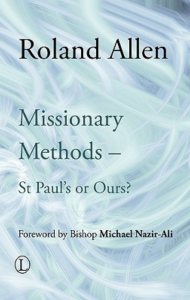 1. Missionary Methods: St Paul’s or Ours? by Ronald Allen
1. Missionary Methods: St Paul’s or Ours? by Ronald Allen
I
read this book over thirty years ago when I was trying to figure out which “missionary methods” might work in Manila. Asbury Theological Seminary required me to read it again in 2018. It is just as relevant today as it was when I first read it in 1986 and when it was first published in 1913. If you want to do mission or be a missionary and you want avoid the mission mistakes of the past, please read and reread this brilliant missionary classic.
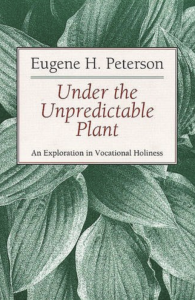 2. Under the Unpredictable Plant: An Exploration in Vocational Holiness by Eugene Peterson
2. Under the Unpredictable Plant: An Exploration in Vocational Holiness by Eugene Peterson
A must-read for everyone called to vocational ministry! Many of us start out in ministry as spiritual directors—only to wake up years later and realize that we have become program directors. Early in the book, Peterson makes a confession that many ministers could make: “Being a Christian, more often than not, seemed to get in the way of working as a pastor. Working as a pastor, with surprising frequency, seemed to put me at odds with living as a Christian.” This book will help vocational ministers get back to being spiritual directors.
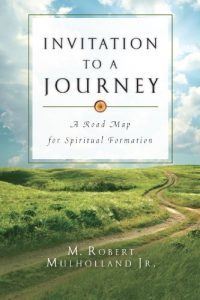 3. Invitation to a Journey by M. Robert Mulholland, Jr.
3. Invitation to a Journey by M. Robert Mulholland, Jr.
This is the best book on spiritual formation that I have read in a long time, and offers the best definition of spiritual formation ever. “Spiritual formation is a process of being conformed to the image of Christ for the sake of others.” Key ideas are process, image of Christ, and for the sake others. This book really helped me.
4. The Leadership Pipeline by Ram Charan, Stephen Drotter, and James Noel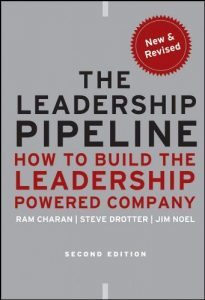
I must confess that after years of reading piles of leadership books, I have grown tired of the topic. However, I am glad I read this one. It confirmed that I desperately and urgently need to acquire new leadership skills if I want to finish strong as I attempt to prepare the organization I lead for the next 100 years and beyond.
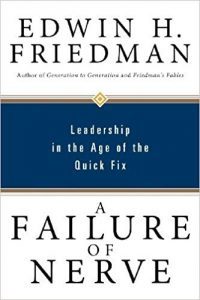 5. A Failure of Nerve by Edwin H. Friedman
5. A Failure of Nerve by Edwin H. Friedman
One of the most insightful and helpful leadership books that I have read in the past decade, and I have read many. Friedman says that these leadership principles apply equally to a parent leading a family or to a president leading a nation. I would add that they also apply to a pastor leading a church.
6. A Theology of Love: The Dynamic of Wesleyanism by Mildred Bangs Wynkoop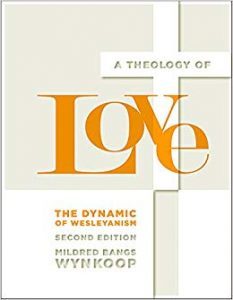
Wynkoop calls Wesley the “Apostle of Love” and writes: “Rather than Wesley representing a theology of holiness it would be more faithful to his major emphasis to call it a theology of love… Wesleyanism, in its most authentic moments, interprets Christian theology in terms of love. It is not authentic when it fails to do so.” This book inspired me to be a better, more loving version of me.
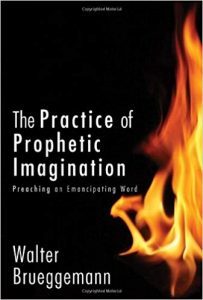 7. The Practice of Prophetic Imagination: Preaching an Emancipating Word by Walter Brueggemann
7. The Practice of Prophetic Imagination: Preaching an Emancipating Word by Walter Brueggemann
While prophetic preaching is certainly neither my interest nor my speciality, Brueggemann had me with this analogy—“Prophetic utterance is not unlike the fastball of Bob Gibson, the great pitcher of the St Louis Cardinals. Of such pitches, the commentators say that they pop, they move, they surprise, they overwhelm. Such utterance staggers and offends among the listeners.” If that is what prophetic preaching does, then I need to attempt it more often.
8. Reclaiming Conversation: The Power of Talk in a Digital Age by Sherry Turkle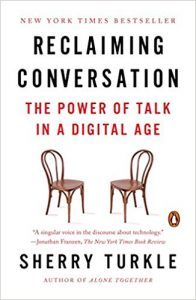
A few quotes to get the gist of the book: “Technology gives us the illusion of companionship without the demands of friendship.” “It is time to put technology in its place and reclaim conversation.” “Among family and friends, among colleagues and lovers, we turn to our phones instead of each other.” “Research shows that those who use social media the most have difficulty reading human emotions, including their own.”
 9. RUN: Endure the Pain, Keep the Faith, Finish Your Race by Bishop Ferdie Cabiling
9. RUN: Endure the Pain, Keep the Faith, Finish Your Race by Bishop Ferdie Cabiling
Warning: Most readers reported that they cried their way through this book. In September 2015, Bishop Ferdie Cabiling (aka The Running Pastor) took the first step of what would be a 2,180-km ultra-marathon across the Philippines. This epic run was called RUN50 and attracted national and international media attention. Ferdie’s goal was to run from from the southernmost tip of the Philippines in Maasim, Sarangani, to the northernmost shore in Aparri, Cagayan. He sought to run at least 50 kilometers per day, in less than fifty days. He ran Monday through Saturday, taking Sundays off to preach at churches along the way. He celebrated his fiftieth birthday along the way, and raised P2,885,482 (Philippine Pesos) for REAL LIFE Foundation scholars. This book narrates that run and teaches leadership lessons learned along the way.
10. The Art of Rest: Faith to Hit Pause in a World that Never Stops by Adam Mabry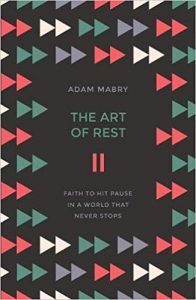
Adam Mabry is a great writer and this book helped me. I laughed and repented. Thank you Adam. Please keep writing.
Check out this video interview of my friend Gordon Robertson discussing The Art of Rest with Adam.
December 17, 2018
Singing at Christmas

NASHVILLE—Last weekend, my entire family kicked off the Christmas season with a trip to Cheekwood, an old mansion in Nashville that’s been turned into a beautiful botanical garden and art museum.
For my five-year-old granddaughter, Josephine, Cheekwood is one of the highlights of the Christmas season. But her favorite thing about Cheekwood is not the light-filled gardens, the real-life reindeer, or the hot chocolate (all of which she loves). Her favorite attraction to see at Cheekwood is the Christmas carolers—professional singers (probably aspiring country artists) dressed like characters out of a Charles Dickens’ novel singing “Joy to the World” and “Silent Night”(and at Josephine’s request, “Jingle Bells”).
For Josephine, as with most people, Christmas is inextricably linked with the music that has been written and sung over the centuries to commemorate and celebrate the birth of Jesus. When we hear Christmas carols, we sense a change in season—a change in the atmosphere.
The tradition of Christmas music and singing is rooted in the very first Christmas.
In Luke 2, when the angels announced the birth of Jesus to the shepherds, they broke into song: “Glory to God in the highest…” (Luke 2:14). And after the shepherds found the baby in the manger, they went away singing (Luke 2:20).
There is something about the message of Christmas—the good news of God sending His Son to earth to deliver us—that cannot be fully expressed with mere words. We can talk and write about Christmas all we want, but there are certain truths about the incarnation that can only be taught (and caught) through music.
When we sing Christ-centered Christmas carols, we are not only transported back to first-century Bethlehem and the historic event of the incarnation, we are also transported forward to the new heavens and new earth and the future consummation of God’s Kingdom.
When we sing “O Come O Come Emmanuel,” we are pushing back against the utopian fantasies of the modern age and reminding ourselves that, as Christians, we “mourn in lonely exile here, until the Son of God appear.”
When we sing “Silent Night,” we are pushing back against the busyness and consumerism of the season. We remind ourselves that Jesus was only noticed on that silent night by those who were waiting for the Messiah—those who paused long enough to see the “Holy infant, so tender and mild.”
When we sing “Joy to the World,” we are pushing back against the pessimism and anxiety of our day and reminding ourselves that we can be joyful because “He rules the world with truth and grace.”
So, as we enter into this Advent season, I would encourage you to be like Josephine.
Enjoy the lights, the reindeer, and the hot chocolate. But make space to allow the songs of season to orient your soul toward the baby in the manger. Allow the Holy Spirit to speak through Christ-centered Christmas songs as we enter a season that is pregnant with meaning but too often full of distractions.
Whether you are in the mall or in your car or in your home, allow the gift of song to draw you closer to Jesus this Christmas.
December 12, 2018
Five-Minute Leadership: Showing Christ’s Love w/ Jahja Gani
Steve Murrell and Dr. Jajha Gani talk about engaging your community through building relationships.
#5MinuteLeadership
Five-Minute Leadership: Showing Christ’s Love w/ Jajha Gani
Steve Murrell and Dr. Jajha Gani talk about engaging your community through building relationships.
#5MinuteLeadership
December 5, 2018
Five-Minute Leadership: Faith Challenges in Campus Ministry w/ Skek Hosoi
Believe God’s promises in the midst of challenges. Steve Murrell and Skek Hosoi examine how to have great faith even when you may not see the fruit of your work.
#5MinuteLeadertship
Steve Murrell's Blog
- Steve Murrell's profile
- 53 followers



